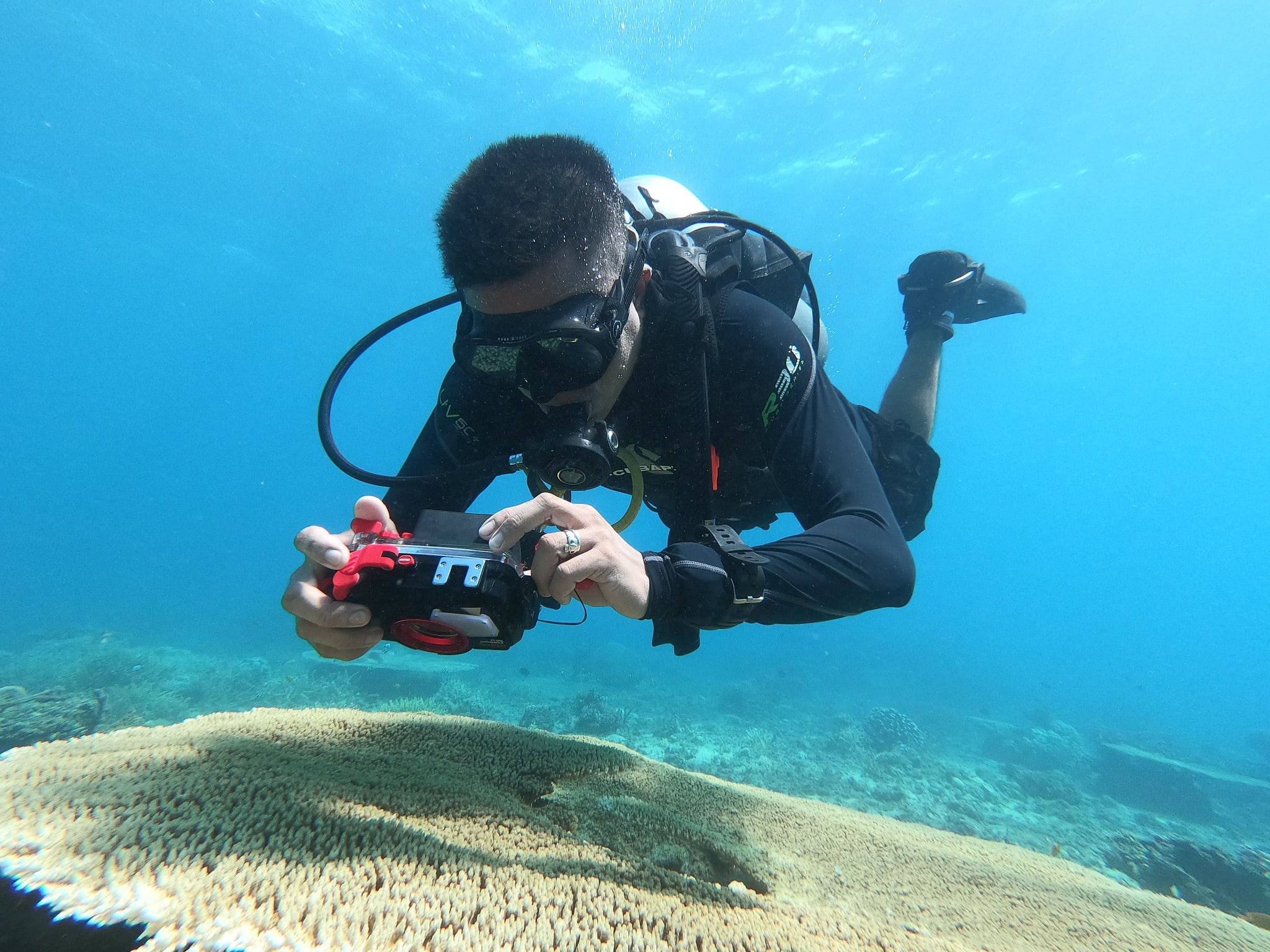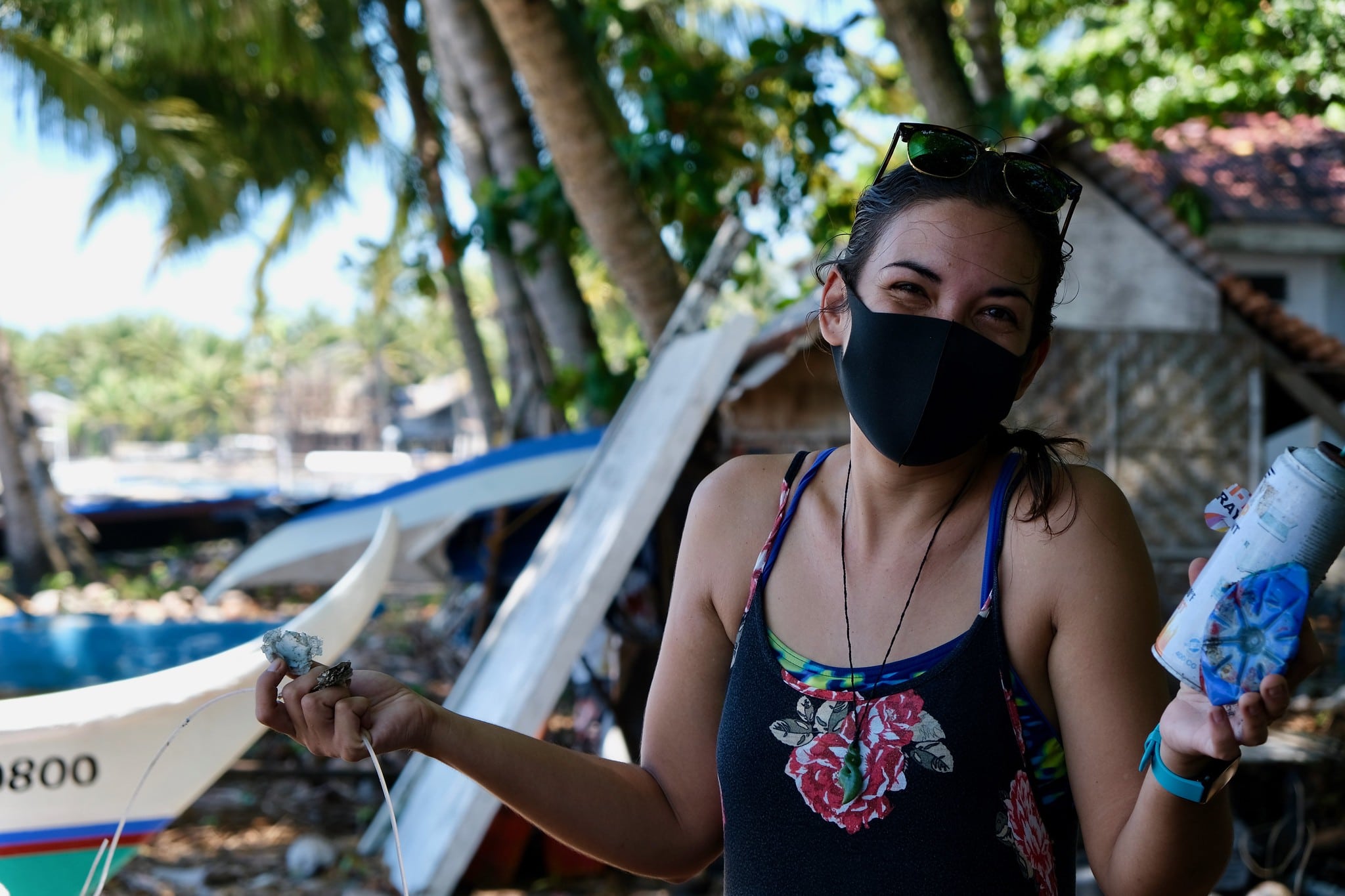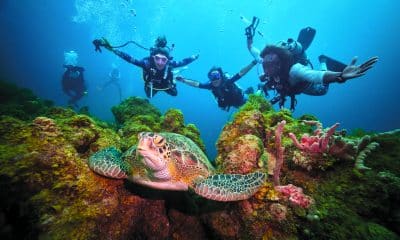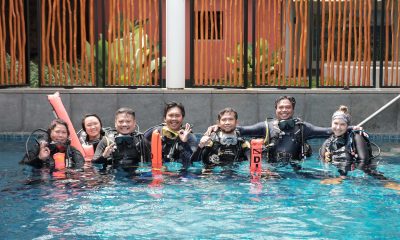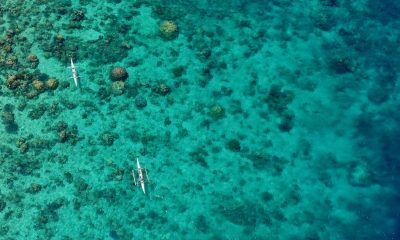Marine Life & Conservation
Scuba Divers can now become environmentally certified through Green Fins
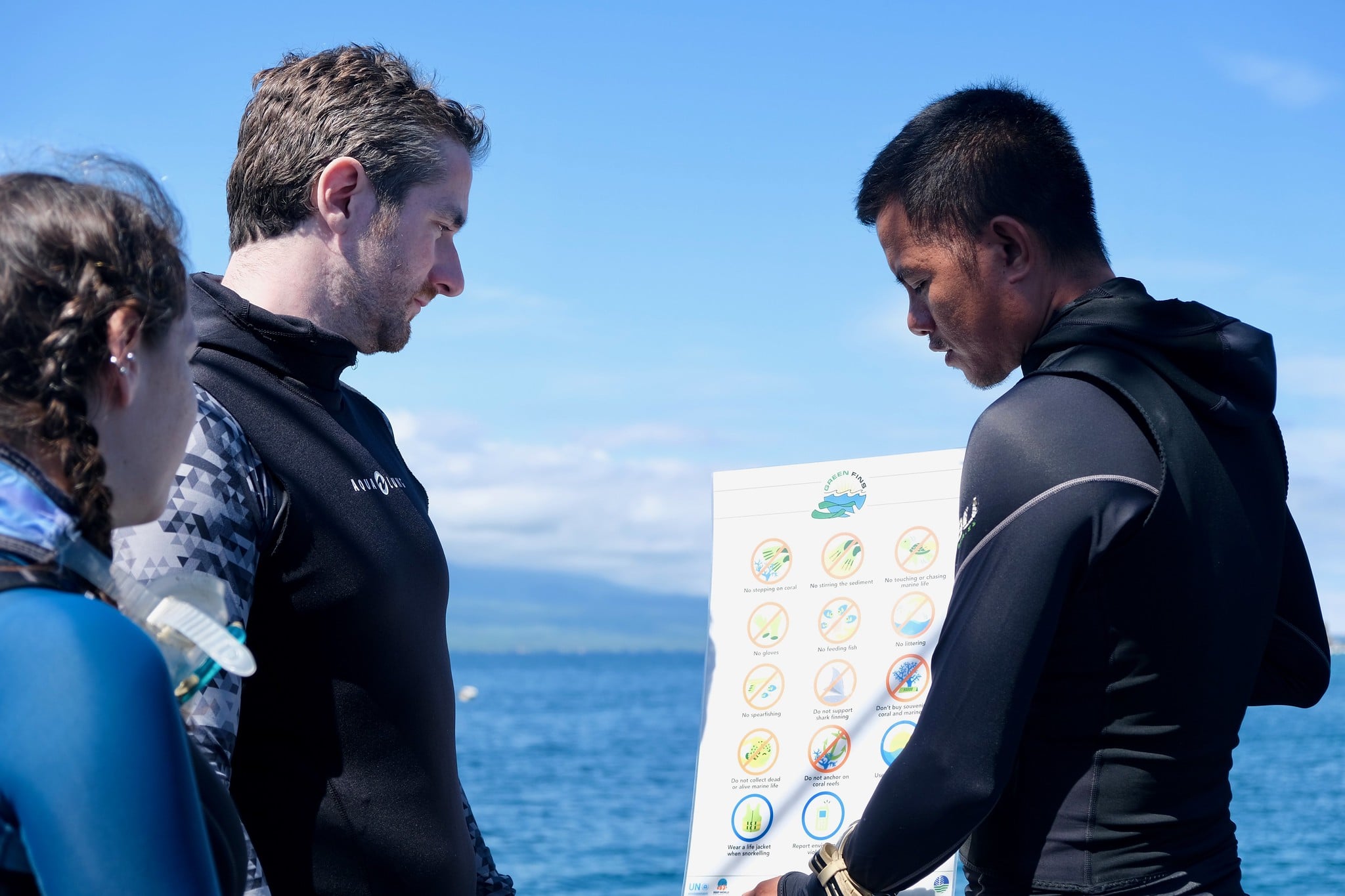
The Reef-World Foundation – the international coordinator of Green Fins – is pleased to announce the launch of the new Green Fins Diver e-Course. This new online course is designed to help recreational divers protect coral reefs by learning how to conduct more environmentally friendly dives.
Improving the behaviour of recreational divers is critical for the survival of coral reefs because an average of 70% of divers contact the reef while diving.* What’s more, divers contact the reef an average of 5.79 times per dive and 36% of those who contacted the reef were unaware they did so. The cumulative impact is significant: over one million new divers are certified annually and ‘on-reef’ tourism is valued at USD $19 billion per year. If these millions of divers learn how to be more environmentally aware and have zero impact dives, it would have a huge impact on the protection of our precious coral reefs for future generations.
All divers, whether professional or recreational, can minimise their impact on the ocean by following environmental best practice while diving. The new Green Fins Diver e-Course is the only course which teaches scuba divers how to prevent diving-related damage to coral reefs by following the highest environmental standards, as set out by the Green Fins initiative. It teaches divers how to behave on the reef to prevent them causing environmental damage; helping to protect coral and other marine life one dive at a time. Divers around the world can take this course for just £19 by enrolling here.
Diving related damage to sensitive marine ecosystems, including coral reefs, is becoming an increasingly significant issue. Even a small breakage from an errant fin kick can cause damage that takes months to recover from; not to mention other negative actions above the water such as littering or buying souvenirs made of marine life. On heavily dived reefs, the cumulative impact of unmanaged tourism can be huge. This damage makes them less likely to survive other local and wider stressors, such as overfishing or run-off from land containing pollutants and plastic debris as well the effects of climate change, such as rising sea temperatures. Research has shown divers who receive environmental information and understand their potential impact on reefs cause significantly less damage to coral.
Following 2019’s successful Green Fins Dive Guide e-Course, the Green Fins Diver e-Course now enables Reef-World to meet the demand for education about sustainable diving from recreational divers. The new course covers straightforward techniques such as best environmental practices from equipment care to underwater photography, above and below the water, which are proven to reduce the level of environmental damage associated with diving.
The course provides divers with three online modules of easy-to-follow content followed by corresponding tests on an intuitive, user-friendly platform:
- Module 1: an introduction to coral reef biology, global and local threats to the marine environment and the Green Fins approach.
-
Module 2: management techniques above water, such as how to prepare and plan an environmentally friendly dive trip: from booking your trip at home to best practices on the boat and caring for your equipment post dive.
-
Module 3: applying best diving practices below water on every dive, learning tips for diving with the least environmental impact and how to have longer marine life interactions as well as how to be an environmentally responsible underwater photographer. Finally, suggesting ways in which divers can use the best practices they have learned and contribute to citizen science projects.
There is a short test at the end of each module which diver must pass in order to finish the course.
The course is available for £19 and, on completion, students will receive a personalised electronic certificate, which is valid for two years and can be displayed as a stamp of individual awareness. The course content will be updated regularly with the latest industry knowledge about environmental best practice so after two years students are encouraged to retake the course to refresh their skills. The proceeds from course certificates support Reef-World’s work to implement the Green Fins programme around the world. Divers who cannot afford to take the course can apply for the Green Fins Diver e-Course Scholarship Fund to receive the certification free of charge.
Gabriel Grimsditch, marine ecosystems expert at the UN Environment Programme, said: “The Green Fins Diver e-Course is more critical than ever to help ensure the survival of reefs and the diving industry. Divers now have a clear roadmap to champion environmental sustainability as our tourism industries build back better.”
JJ Harvey, Director at The Reef-World Foundation, said: “The Green Fins Diver e-Course enables divers from all backgrounds to become more environmentally aware, understand the main environmental threats posed by scuba diving and be able to minimise those threats. We’re so proud of the results from our 2019 course and we’re excited that we can now also meet demand from recreational divers worldwide who want to reduce their negative impact on the coral reefs they visit.”
Green Fins is the only internationally recognised environmental standard for dive and snorkel operators, established through a partnership between the UN Environment Programme and The Reef-World Foundation. Green Fins uses a unique and proven three-pronged approach; green certifications of dive centres, strengthening regulations and environmental education for dive staff, divers and government.
For more information, or to sign up for the Green Fins Diver e-Course, please visit: https://greenfins.net/green-fins-diver/
* Figures from Reef-World’s #RedefinetheDive campaign (IYOR 2018). See: https://greenfins.net/news/green-fins-iyor-2018/.
Marine Life & Conservation
Double Bubble for Basking Sharks

 The Shark Trust is excited to announce that, for two more days only, all donations, large or small, will be doubled in the Big Give Green Match Fund!
The Shark Trust is excited to announce that, for two more days only, all donations, large or small, will be doubled in the Big Give Green Match Fund!
Donate to Basking in Nature: Sighting Giants
The Shark Trust is hoping to raise £10k which will be doubled to £20k. This will go towards Basking in Nature: Sighting Giants. And they need YOUR help to reach they’re goal.
The Shark Trust’s citizen science project is to monitor and assess basking sharks through sightings; encouraging data collection, community engagement, and promoting nature accessibility. This initiative aims to enhance health and wellbeing by fostering a deeper connection with British Sharks.
Campaign Aims
- Increase citizen science reporting of Basking Sharks and other shark sightings to help inform shark and ray conservation.
- Provide educational talks about the diverse range of sharks and rays in British waters and accessible identification guides!
- Create engaging and fun information panels on how to ID the amazing sharks and rays we have on our doorstep! These can be used on coastal paths around the Southwest. With activities and information on how you can make a difference for sharks and rays!
- Promote mental wellbeing through increasing time in nature and discovering the wonders beneath the waves!
Donate, and double your impact. Click Here
Marine Life & Conservation
Leading UK-based shark conservation charity, the Shark Trust, is delighted to announce tour operator Diverse Travel as a Corporate Patron

 Corporate Patrons provide a valuable boost to the work of The Shark Trust. The Trust team works globally to safeguard the future of sharks, and their close cousins, the skates and rays, engaging with a global network of scientists, policymakers, conservation professionals, businesses and supporters to further shark conservation.
Corporate Patrons provide a valuable boost to the work of The Shark Trust. The Trust team works globally to safeguard the future of sharks, and their close cousins, the skates and rays, engaging with a global network of scientists, policymakers, conservation professionals, businesses and supporters to further shark conservation.
Specialist tour operator Diverse Travel has operated since 2014 and is committed to offering its guests high quality, sustainable scuba diving holidays worldwide. Working together with the Shark Trust will enable both organisations to widen engagement and encourage divers and snorkellers to actively get involved in shark conservation.
“Sharks are truly at the heart of every diver and at Diverse Travel, we absolutely share that passion. There is nothing like seeing a shark in the wild – it’s a moment that stays with you forever!” says Holly Bredin, Sales & Marketing Manager, Diverse Travel.
“We’re delighted to celebrate our 10th year of business by becoming a Corporate Patron of the Shark Trust. This is an exciting partnership for Diverse and our guests. We will be donating on behalf of every person who books a holiday with us to contribute towards their vital shark conservation initiatives around the world. We will also be working together with the Trust to inspire divers, snorkellers and other travellers to take an active role – at home and abroad – in citizen science projects and other activities.”
Paul Cox, CEO of The Shark Trust, said:
“It’s an exciting partnership and we’re thrilled to be working with Diverse Travel to enable more divers and travellers to get involved with sharks and shark conservation. Sharks face considerable conservation challenges but, through collaboration and collective action, we can secure a brighter future for sharks and their ocean home. This new partnership takes us one more valuable step towards that goal.”
For more information about the Shark Trust visit their website here.
For more about Diverse Travel click here.
-

 News3 months ago
News3 months agoHone your underwater photography skills with Alphamarine Photography at Red Sea Diving Safari in March
-

 News3 months ago
News3 months agoCapturing Critters in Lembeh Underwater Photography Workshop 2024: Event Roundup
-

 Marine Life & Conservation Blogs3 months ago
Marine Life & Conservation Blogs3 months agoCreature Feature: Swell Sharks
-

 Blogs2 months ago
Blogs2 months agoMurex Resorts: Passport to Paradise!
-

 Blogs2 months ago
Blogs2 months agoDiver Discovering Whale Skeletons Beneath Ice Judged World’s Best Underwater Photograph
-

 Marine Life & Conservation2 months ago
Marine Life & Conservation2 months agoSave the Manatee Club launches brand new webcams at Silver Springs State Park, Florida
-

 Gear Reviews3 months ago
Gear Reviews3 months agoGear Review: Oceanic+ Dive Housing for iPhone
-

 Gear Reviews2 weeks ago
Gear Reviews2 weeks agoGEAR REVIEW – Revolutionising Diving Comfort: The Sharkskin T2 Chillproof Suit


